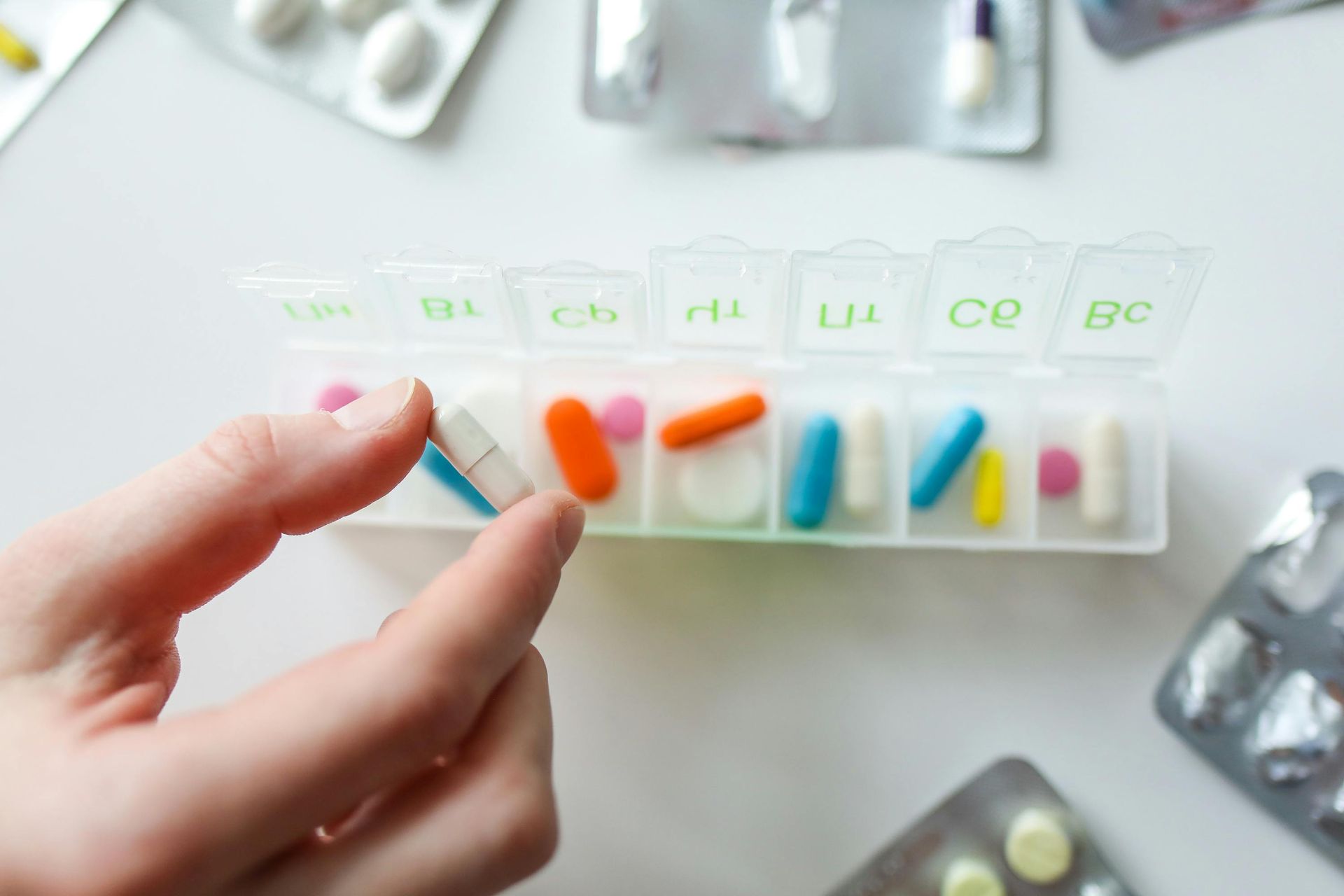How Ketamine Infusion Therapy Helps Mental Health

The Albany Clinic • October 9, 2023
Ketamine infusion therapy is a groundbreaking treatment that has shown promising results in helping individuals struggling with various mental health conditions. This therapy involves the administration of ketamine, a dissociative anesthetic primarily used in surgical procedures, in a controlled and monitored setting.
While ketamine has been long known for its anesthetic properties, recent research has highlighted its potential in treating mental health disorders such as depression, anxiety, and post-traumatic stress disorder (PTSD).
Understanding Ketamine Infusion Therapy
The Science Behind Ketamine
Ketamine acts on the neurotransmitter glutamate, which plays a crucial role in regulating mood, cognition, and pain perception. By blocking a specific receptor involved in glutamate transmission called N-methyl-D-aspartate (NMDA), ketamine can modulate brain signaling and potentially alleviate symptoms of mental health disorders.
The Process of Infusion Therapy
During ketamine infusion therapy, patients receive a controlled dose of ketamine intravenously over a period of time, typically lasting several minutes. The dosage and duration of the infusion vary depending on the individual’s specific needs and responsiveness to the treatment. The therapy is administered under the close supervision of trained medical professionals, ensuring the utmost safety and efficacy.
Ketamine infusion therapy has gained significant attention in recent years for its potential to treat a variety of mental health disorders. It is particularly effective in cases where traditional treatments have failed to provide relief. The therapy’s success lies in its ability to modulate brain signaling, allowing for a rapid and profound impact on the symptoms of depression, anxiety, and post-traumatic stress disorder (PTSD).
When administered intravenously, ketamine bypasses the digestive system, ensuring a fast and efficient delivery to the brain. This direct route allows for a more immediate response, with patients often experiencing relief within hours or even minutes after the infusion. The rapid onset of action sets ketamine apart from other treatment options, which may take weeks or even months to show results.
During the infusion, patients are closely monitored by medical professionals to ensure their safety and well-being. Vital signs such as heart rate, blood pressure, and oxygen levels are regularly checked to detect any potential adverse reactions. The dosage and duration of the infusion are carefully adjusted based on the individual’s response, ensuring that the therapy is tailored to their specific needs.
While ketamine infusion therapy has shown promising results, it is not a one-size-fits-all solution. Each patient’s response to the treatment can vary, and additional sessions may be required to achieve long-term benefits. The therapy is often used in conjunction with other forms of therapy, such as psychotherapy or medication, to provide comprehensive and holistic care.
Furthermore, ketamine infusion therapy is not without potential side effects. Some individuals may experience temporary dissociative or hallucinogenic effects during the infusion, which typically subside shortly after the treatment. Other possible side effects include nausea, dizziness, and increased blood pressure. However, these side effects are generally mild and well-tolerated.
The Connection Between Ketamine and Mental Health
Ketamine’s Impact on the Brain
Researchers have discovered that ketamine, a powerful dissociative anesthetic, has the ability to rapidly increase the production of synapses , the connections between brain cells. This synaptic growth, known as synaptogenesis, is believed to play a crucial role in the alleviation of symptoms associated with mental health conditions.
By enhancing the brain’s ability to adapt and reorganize itself, ketamine offers a promising avenue for the treatment of various psychiatric disorders.
When administered in controlled doses, ketamine acts on the brain’s glutamate system, specifically targeting the N-methyl-D-aspartate (NMDA) receptors. This mechanism of action sets ketamine apart from traditional antidepressant medications, which primarily target the brain’s serotonin system. By modulating the glutamate system, ketamine triggers a cascade of molecular and cellular events that ultimately lead to the growth of new synapses.
Furthermore, ketamine has been found to promote the release of brain-derived neurotrophic factor (BDNF), a protein that plays a crucial role in the growth, survival, and function of neurons. BDNF is known to be reduced in individuals with depression and other mental health disorders. By increasing BDNF levels, ketamine helps to restore the proper functioning of neural circuits, leading to an improvement in mood and overall mental well-being.
Mental Health Conditions Treated by Ketamine
Ketamine infusion therapy has shown significant potential in relieving symptoms of various mental health conditions. These include, but are not limited to, treatment-resistant depression, bipolar depression, major depressive disorder, and post-traumatic stress disorder (PTSD). The therapeutic effects of ketamine have been particularly remarkable in individuals who have failed to respond to traditional antidepressant medications or other therapeutic interventions.
One of the most well-known applications of ketamine infusion therapy is in the treatment of treatment-resistant depression. This form of depression is characterized by a lack of response to multiple antidepressant medications, leaving individuals with limited options for relief. Ketamine, with its unique mechanism of action, offers new hope to these individuals by providing rapid and sustained relief from depressive symptoms.
Bipolar depression, a subtype of bipolar disorder characterized by episodes of depression, is another condition that has shown positive response to ketamine treatment. Traditional antidepressant medications can sometimes trigger manic episodes in individuals with bipolar disorder, making them unsuitable for long-term use. Ketamine, on the other hand, has been found to effectively alleviate depressive symptoms without inducing mania, making it a valuable treatment option for individuals with bipolar depression.
In addition to depression, ketamine has also shown promise in the treatment of other mental health conditions such as major depressive disorder and post-traumatic stress disorder (PTSD). Major depressive disorder is a debilitating condition that affects millions of people worldwide , and ketamine offers a glimmer of hope for those who have not found relief with conventional treatments.
Similarly, individuals with PTSD, who often experience intense and distressing symptoms as a result of past traumatic events, may benefit from the rapid and robust antidepressant effects of ketamine.
It is important to note that while ketamine infusion therapy has shown promising results, it is still considered an emerging treatment and further research is needed to fully understand its long-term efficacy and safety. However, the growing body of evidence suggests that ketamine holds great potential in revolutionizing the field of mental health treatment, offering new hope to individuals who have been suffering in silence.
Benefits of Ketamine Infusion Therapy
Immediate Relief from Symptoms
One of the most remarkable aspects of ketamine infusion therapy is its ability to provide rapid relief from symptoms. Unlike traditional antidepressant medications, which may take weeks or even months to take effect, ketamine can often produce noticeable improvements within hours or days. This immediate relief can be life-changing, particularly for individuals experiencing acute distress or suicidal ideation.
Long-Term Effects of Therapy
Studies have suggested that ketamine infusion therapy may have long-lasting effects , even after the treatment course is completed. Some patients report experiencing prolonged symptom relief and improved overall mental well-being following therapy. This aspect of ketamine treatment has captured the interest of researchers and clinicians alike, as it has the potential to revolutionize current approaches to mental health care.
Potential Risks and Side Effects of Ketamine Infusion
Common Side Effects
Although ketamine infusion therapy is generally safe and well-tolerated, there are potential side effects that individuals should be aware of. These can include dissociation, changes in blood pressure or heart rate, dizziness, and mild nausea. However, these side effects are typically transient and subside shortly after the infusion.
Addressing Potential Risks
To mitigate potential risks, thorough medical screening and assessment are conducted prior to starting ketamine infusion therapy. This ensures that individuals with specific medical conditions or contraindications are not exposed to unnecessary risks. Moreover, the therapy is closely monitored by medical professionals throughout the entire process, allowing for immediate intervention if any adverse reactions occur.
The Future of Ketamine Infusion Therapy
Ongoing Research and Developments
The application of ketamine in mental health treatment continues to evolve through ongoing research and developments. Scientists are exploring various factors, such as optimal dosing strategies, maintenance treatments, and potential combination therapies, to maximize the benefits of ketamine infusion for individuals struggling with mental health disorders.
The Role of Ketamine in Modern Psychiatry
With its rapid and potentially long-lasting effects, ketamine infusion therapy has the potential to revolutionize the field of psychiatry. As more evidence emerges regarding its efficacy and safety, ketamine may become a vital tool in the treatment arsenal for mental health professionals, offering hope and relief to individuals who have previously felt stuck in their recovery journeys.
Parting Words
In conclusion, ketamine infusion therapy shows considerable promise in helping individuals with mental health conditions experience relief from symptoms that have been unresponsive to conventional treatments. With further research and advancements, ketamine has the potential to reshape the landscape of mental health care, providing new avenues of hope and healing for those in need.
If you are interested in learning more about ketamine treatment in Carbondale, IL, contact us at The Albany Clinic and request your consultation today.
The post How Ketamine Infusion Therapy Helps Mental Health appeared first on The Albany Clinic.






